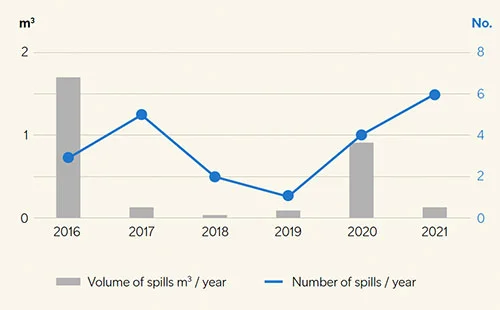In 2021, we renewed our ISO 14001:2015 certification.
This is an international standard that shows we are committed to continually reducing our environmental impact, and therefore an important tool in helping us prevent pollution.
We did see an increase in the number of spills last year, so we recognise that there is more work to be done. That said, although there were more spillages, the amount of oil spilled was less than in 2020, which indicates procedures are in place to detect and prevent further impact.
- Zero oil and fuel spills.
- Reducing the use of harmful chemicals.
- The number of oil spills increased from four to six small spills, each less than 5 litres. The total amount of oil spilled was seven times lower than in 2020. This low volume of spills indicates that procedures are in place to detect spills at an early stage. All oil spills are investigated formally, and preventive measures are stipulated on a case-by-case basis to prevent similar future events.
-
Due to COVID-19 safety measures, we had to increase the amount of cleaning chemicals being used on board for the safety of our crew. However, we have continued rolling out our electrochemically activated solution, a biodegradable alternative to conventional disinfectants.

less than 5l
The number of oil spills increased from four to six small spills, each less than 5 litres. The total amount of oil spilled was seven times lower than in 2020.
ISO 14001:2015
In 2021, we renewed our ISO 14001:2015 certification.
A step ahead in keeping sensitive seas free of sewage
The Baltic Sea is ecologically unique and the world’s largest brackish water areas. Over-fertilisation (also called eutrophication), caused by excessive inputs of nitrogen and phosphorus, is one of the biggest threats to the delicate nutrient balance of this vital ecosystem.
Sewage discharged from passenger ships contributes to this issue. However, thanks to new regulations banning this from happening, the situation should improve.
At Stena Line, we stopped discharging sewage into the Baltic Sea many years ago, instead using our own port reception facilities or in collaboration with others. We welcome the new legal requirements and hope these will push the rest of the industry in the right direction to keep our waterways less polluted.
There’s still a long way to go and our efforts are just one small step, but by combining a forward-thinking approach with wider efforts to reduce our vessels’ emissions and pollutants, we will continue striving to minimise our impact on life below water.
‘At Stena Line, we stopped discharging sewage into the Baltic Sea many years ago, instead using our own port reception facilities or in collaboration with others.’
The measures making waves in marine life protection
Since 2019, we have been trialling an anti-fouling paint component called Selektope which naturally repels barnacles and other organisms from our vessels’ hulls.
The organic, copper-free compound also means that our waters are kept cleaner and safer for marine life by eradicating the leakage of metal oxides. First introduced on Stena Estrid in 2019, the paint is now being used on our two other newly built E-flexers Stena Embla and Stena Edda, and will be introduced on two more vessels later this year.
On top of this, the new vessels are using Castrol biodegradable lubricant and hydraulic oils. These have been tried and tested as reliable for important vessel components like RORO (wheeled cargo) equipment, propellers and bow thrusters. And all that with significantly less harm to marine life.
Life below water stories
Our focus areas
Our commitment to sustainability is centred around five focus areas linked to the UN Global Goals which are directly related to our business.
Green list
It’s very, very green and long. Each number represents an action we have done on our journey towards a sustainable future. We are talking about the Green List!